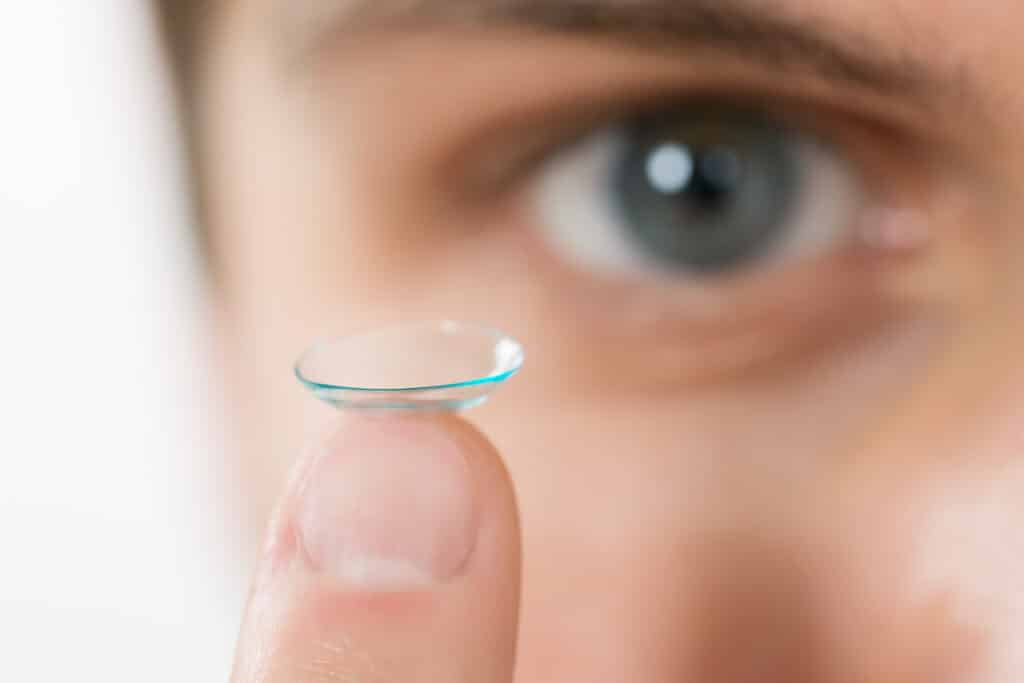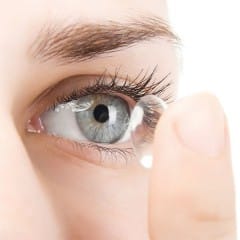Contact Lenses in North Attleboro & North Dartmouth, MA
Over 140 million people wear contact lenses, worldwide. New advances in contact lens technology now allow some children with refractive errors to wear contact lenses at a young age, under the supervision of an experienced doctor. In addition, the newer technology of MISIGHT can assist children in controlling progression of their nearsightedness. This FDA approved tool has proven instrumental in controlling MYOPIA. Multifocal contact lenses are also available to help baby boomers achieve clear and convenient vision correction at all distances. Ask one of our experienced doctors about whether or not contact lenses are right for you or your child! We offer contact lenses from the following companies:

Benefits of Contact Lenses
Unlike glasses, contact lenses move with your eyes so you can enjoy a larger field of vision with fewer distortions. You also don’t have to deal with frames hovering in your peripheral vision or external lenses that fog up on cold days or get wet in the rain.
How Often Should Contact Lenses Be Replaced?
For optimal vision and safety, contact lenses should be worn only for a designated amount of time before they need to be replaced with a new pair. Your doctor will likely provide you with a sufficient supply of lenses so that you can conveniently replace them when required for continued clear vision.
With continued wear, protein and lipid deposits begin to accumulate on the surface of the lens, which weakens its corrective powers and eventually leaves patients with poor vision if worn for too long. Following the designated replacement schedule ensures safe and effective vision results.
Depending on the type of lenses selected, replacements may be needed quarterly, monthly, every 1-2 weeks or daily. In between replacements, the lenses will need to be cleaned and disinfected after each use (except for daily wear lenses). Your doctor will provide you with specific instructions for the replacement of your lenses. Daily replacement contact lenses have become the preferred replacement regimen, fostering the best eye health, comfort, and convenience.
Types of Contact Lenses
There are several different types of contact lenses available to correct a wide range of refractive errors. The most common types include:
- Spherical lenses – for correction of nearsightedness and farsightedness
- Toric lenses – for correction of astigmatism
- Bifocal lenses – for correction of presbyopia (age-related loss of focusing ability)
- Scleral lenses- address distorted corneas from injury of Keratoconus, as well as dry eye cases
In addition to the type of refractive error they correct, lenses may also be clear or tinted for convenience, therapeutic or cosmetic purposes. The different tints available include:
- Cosmetic enhancements – designed to enhance the natural eye color and ideal for light-colored eyes, which will appear as a blend of the natural color and lens tint
- Opaque or “cosmetic” tints – change the color of dark or light eyes by overlying the colored part of the eye for a noticeable yet natural-looking result
- Visibility tints – very pale colorings that help make the lens more visible during handling, while having no affect on eye color
How Long Can Contact Lenses Be Worn?
Each type of contact lenses are designed to be worn for a certain amount of time before they need to be removed and/or replaced. It is important to follow these guidelines to ensure clear, healthy vision and to reduce the risk of complications.
Daily wear lenses are to be worn while you are awake, for up to 10 hours a day. They should be removed each night and cleaned and disinfected overnight before they are inserted again in the morning.
Extended wear lenses can be worn continuously for up to seven days in a row, including while you sleep. These lenses usually have a higher water content or thinner center than daily lenses, allowing more oxygen to reach the eye over the extended period of time. After seven days, the lenses will either be removed and cleaned, or discarded and replaced with a new pair. Careful monitoring by your Lenscrafters doctor is essential for safe use of extended wear lenses.
How To Care For Contact Lenses

Make sure to see your doctor for regular check-ups and only wear your contacts for the length of time recommended, even if they continue to feel comfortable. If you have any questions about your contacts, especially if your eyes feel sensitive to light or look infected, feel free to call us for assistance, seven days a week.
How do I choose the right Contact Lens Solution?
After being fitted for contact lenses, your doctor will recommend a lens care system to clean and disinfect the lenses and make them as safe and comfortable as possible. It is important to follow your doctor’s instructions for care and avoid mixing different solutions, which may lead to discolored lenses, eye discomfort or eye injury. Most solutions for soft contact lenses perform the following functions:
-
- Daily cleaning – first step to remove debris that accumulates on the lens
- Disinfecting – kills any bacteria or fungus on the lens
- Rinsing and storing – often combined with disinfecting to keep lenses clean and safe
- Comfort or lubricating drops – relieve dry eyes for long days
- Protein removal – removes protein deposits and restores a clean lens surface
Scleral contact lenses
Here at Dr. John Magalhaes and Associates, we specialize in contact lenses. Contact lenses are an outstanding option for vision correction enjoyed by many. As a special service to our patients, we often custom fit scleral lenses to a select group of patients. The highly specific and precise fitting of the ONE FIT Scleral contact lens allows for extensive degrees of customization for our patients. Please inquire about this very comfortable, therapeutic lens.
Contact lenses make it easier for people with poor vision to work and carry out daily tasks. About 45 million people in the U.S. use them to correct their vision.
Soft contact lenses are the same size as your corneas and lie on them. Scleral contact lenses are softly rigid and larger than your cornea. They rest on the sclera, the whites of your eyes. Being gas permeable, they allow oxygen to reach your cornea and are better for eye health. They provide better vision and can be used for longer periods. They’re valuable if one cannot wear regular contact lenses due to an irregular corneal shape or a disease.
What Are Scleral Contact Lenses?
The two common types of contact lenses are rigid and soft. Rigid lenses are often gas permeable, letting oxygen reach your cornea. Scleral contact lenses are larger than soft contact lenses. They’re firm, hold their shape, and rest on the sclera around the cornea.
Like other contact lenses, scleral contact lenses correct poor vision caused by refractive errors. They can correct:
- Nearsightedness (myopia)
- Farsightedness (hyperopia)
- Distorted vision (astigmatism)
- Difficulty with near vision with age (presbyopia)
Scleral contact lenses are made of gas-permeable material. They allow oxygen to pass through to your cornea. Scleral lenses are valuable if your corneas are abnormally shaped, as in astigmatism and Keratoconus. You can also use scleral lenses after LASIK (laser in-situ keratomileusis), a type of surgery to correct refractive errors, or corneal transplants. The space between the scleral lens and the eye is a reservoir that you fill with saline. Scleral lenses are comfortable for people with dry eyes.
Disadvantages of Scleral Contact Lenses
Scleral lenses are valuable for people who can’t use other types. But they have a few disadvantages:
- Not every optometrist and ophthalmologist provides them. These lenses need special training.
- Scleral lenses are more expensive than soft contact lenses, due to its high specificity of fit-but they can be used for much longer.
- Scleral lenses often collect debris and need cleaning during the day.
RELATED: How I Cook, Drive, & More With Vision Loss
Scleral Lenses vs. Contact Lenses
Soft contact lenses rest on the cornea. They’re soft, and most people find them comfortable to wear. But these contact lenses can be uncomfortable for people with dry eye disease, Stevens-Johnson syndrome, Sjogren’s syndrome, keratoconus (abnormally shaped cornea), and graft-versus-host disease. People who have had corneal surgery may also be unable to use regular contact lenses.
Scleral contact lenses are larger than the cornea. Most are 14 to 24 millimeters in diameter. They vault over the cornea and rest on the sclera, the tough, white part of the eye. The fluid within keeps the eyes moist for longer.
Scleral lenses are not new. Their advantages in terms of oxygen supply to the cornea have been known for decades. They prevent hypoxic damage to the cornea and may also reverse damage that occurred previously.
Contact Solution for Scleral Lenses
You should always use specific solutions meant for contact lens storage and care. Never use water or any detergent solution for your contact lenses. Multipurpose contact lens solution can be used for cleaning and disinfecting your scleral contact lenses. These solutions also condition your lenses. You should replace your storage case every three months.
Other lens cleaning solutions contain hydrogen peroxide. These solutions also clean and disinfect your lenses. They also break up and remove trapped debris, protein, and fatty deposits. Hydrogen peroxide can damage your eyes. You must use a neutralizer that makes it safe to put your lenses into your eyes. A neutralizer is always sold as part of hydrogen peroxide lens cleaning kits. Leave your contact lenses in the neutralizer solution for at least six hours.
How Do You Put in Scleral Contact Lenses?
The process for putting in scleral lenses is different from that for soft lenses. Your scleral lenses have a reservoir to hold fluid and keep your cornea moist. These steps are needed:
- Wash your hands well with soap and water.
- Fill the lens well with a preservative-free saline solution. Preservatives can damage your cornea.
- Make sure there are no bubbles in the lenses, as these will blur your vision.
- When the lens well is full, place the lens in your eye using the three-finger tripod method.
RELATED: Eye Drops: Are You Using the Right Ones?
Gas Permeable Contact Lenses
Gas permeable contact lenses are made of a material that holds shape but allows oxygen to pass through. Compared to soft lenses, about two to four times more oxygen is available to your corneas. They’re smaller than regular contact lenses and cover about three-quarters of the cornea. They’re made of a rigid material and hold their shape in use.
These lenses provide crisper, clearer vision than soft contact lenses. They’re more durable and easier to handle. But you may need some time to get used to them. Their cleaning and disinfection process is more complex too.
Caring for Your Lenses
Your eyes are precious, and taking care of your lenses is important for keeping them healthy. Some important measures include:
- Wash your hands before putting in or removing your contact lenses.
- Always remove your lenses when sleeping. Wearing your lenses while sleeping carries an eight times higher risk of infection.
- Water can carry germs. Keep your lenses away from water. Never wear them while swimming or showering.
- Clean your lenses with a contact lens disinfecting solution.
- Clean your contact lens case with the same solution and change it every three months.
Caring for your lenses is vital for eye health. Improper care can cause diseases like keratitis and eye infections. If you have red eyes or your eyes are painful, remove your contact lenses immediately and talk to your doctor. Serious eye infections happen with contact lens use and can cause blindness.
Patient Testimonial
“Staff is extremely professional and caring. Wait time was terrible this visit. Appointment at 11:00 and it’s noon and haven’t seen Dr yet…. and there was only one patient ahead of me. I have been a patient for several years and have always appreciated the great care.”





